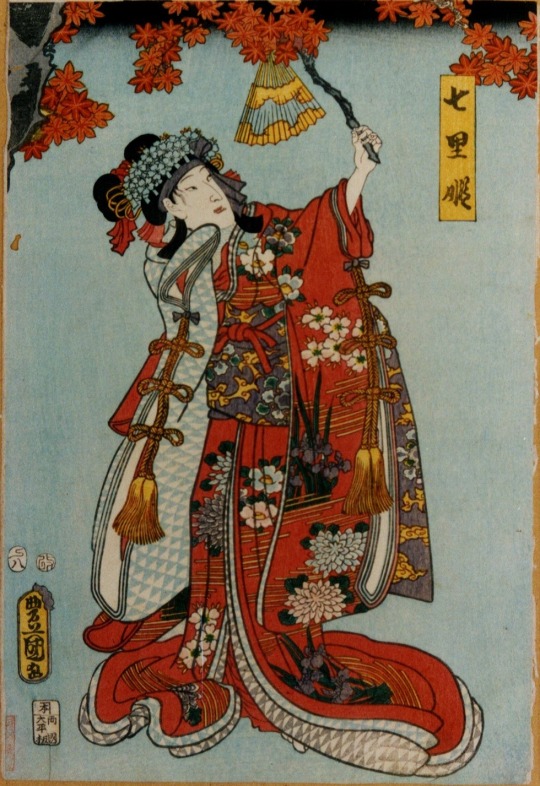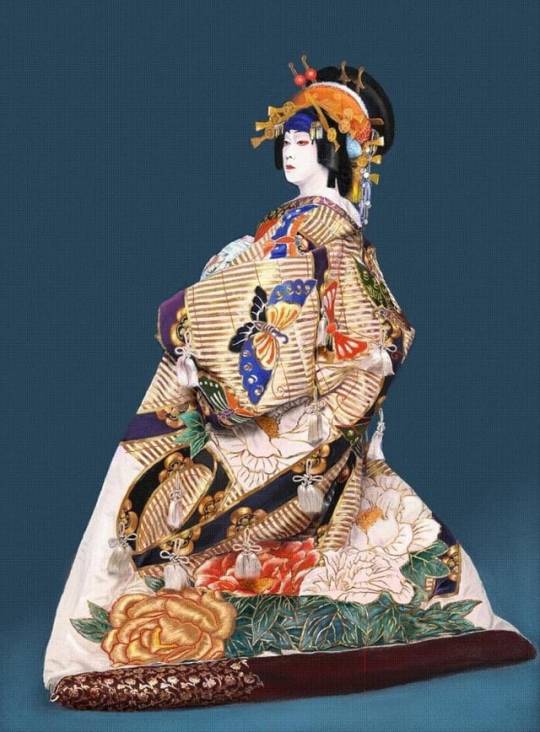#kamuro
Explore tagged Tumblr posts
Note
Hello ! I was curious, I haven't been able to find a name for this specific decoration at the ends of furisode sleeves with the knots and tassels, do you have any idea what they're called or more info on them? (Your blog is a wonderful resource and gallery, thank you !)


Hi and thank you for your kind words <3
You're lucky, I've been through that specific rabbit hole before ;) You can find those past posts wondering about kamuro apprentices fashion here and here ;)
TLDR: I don't have a specific answer as they're refered by several names - generic terms sodekukuri/sodegukuri (sleeve tie) or sode no himo (sleeve "ribbon") being the most prevalent.
#ask#kamuro#furisode#sleeve tie#sleeve ribbon#sode kukuri#sode gukuri#children kimono#kimono#reference#ressources#fashion history#着物#振り袖
121 notes
·
View notes
Text







Last year I watched Samurai 7 for the first time. I had been wanting to watch it for years and it really was worth it when I finally got to it. It's full of great character designs but my absolute favorite are the city guards. I decided to build a cosplay for them and continue my trend of cosplaying obscure characters. :)
Coincidentally, the series is 20 years old this year, what great timing!
#Samurai 7#サムライ7#かむろ衆#Kamuro#Art of azalea#cosplay#yes they have a novelization and the spine art is SO COOL#most photos taken by my coworker Caleb L and edited by me#also yes my costume is wrinkly bc i did haphazardly put it away after the convention not thinking i would get better photos later oops
20 notes
·
View notes
Text
Yoshiwara: Life of a Kamuro
Negotiations
Being sold to a brothel or Yūkaku (遊廓) was common in the Edo period. There was a belief that a true courtesan could only be one who had lived as such for her entire life. Finding dedicated recruits was difficult, so grooming them from an early age became the convenient solution. Scouts of brothels targeted towns hit by natural disasters or diseases, which were typically already poor and vulnerable. The scouts told the parents that the girl would live in luxury, wear the finest silks, eat white rice, and work in their teahouse, selling sex. They were notoriously famous for lying about the conditions their daughter would live in. However, the parents agreed easily; they were already living in poverty, and having one less mouth to feed was a relief. Socially, it was also completely acceptable. It was a child's duty to help out their parents if need be. And lastly, they were paid. It sounded like a win-win solution: their daughter had an 'amazing' job opportunity, while they made some quick money in their already desperate situation. It was common belief that prostitution, shameful as it may be, is easier than doing back-breaking work on the family farm. However, of course, this could not be further from the truth.
When the girl was sold, they took her to Yoshiwara. There, she experienced the first sight of the gates, which she entered for the first and usually the last time in her life. However, the contract wasn't so simple. They often employed girls specifically for their role as a kamuro, which enabled brothel-keepers to avoid paying large sums upfront for girls who didn't meet expectations early on. The expectation was that once the girl was ready to become a prostitute, her contract would be renewed for the standard 10-year term. Yet, during the contract negotiation, her parents or procurer might arrive armed with a more enticing offer from a different brothel. The brothel-keepers were powerless to stop them from taking her away and selling her to another brothel, along with all the care and investment that had gone into her training. Most kamuro stayed at the brothel they were originally sold to.
Arrival
The first day in her brothel she was bathed, fed and ultimately transformed into the appearance of a Kamuro (禿). They were paired with a higher-ranking courtesan, whom they were supposed to call 'Elder Sister'. However, these sister relationships differ significantly from those among geisha. The relationship between a maiko and her older sister is mainly ceremonial. The geisha introduces her younger sister to society, teaches her proper etiquette, and helps her establish herself socially. However, the maiko's okiya covers the expenses of her training and debut, providing housing, food, kimono, and hair ornaments. In contrast, a courtesan is personally responsible for feeding, clothing, and housing her kamuro. If the courtesan didn't work, the kamuro would starve. In return, the kamuro spends much of her time directly serving her older sister, either as an errand girl or as a splendidly dressed status symbol. Additionally, if the kamuro debuted as a courtesan, her older sister would bear the staggering costs herself.
The new Kamuro was given a name. Kamuros had simple names, unlike the flowery names often given to courtesans. Their names were usually written in katakana, a script considered less formal and more childlike compared to the sophisticated kanji. They were often paired together, like Iroha (Color) and Nioi (Scent), or Chidori (Sandpiper) and Namiji (Trail of Waves).

(An Oiran accompanied by two Kamuro; Torii Kiyonaga)
The job of a Kamuro
As girls aged five to nine, they paraded in the entourage of their 'elder sisters' courtesans when they appeared in public. Kamuros also ran errands for them and attended to them when they met with clients. They dashed around the streets of Yoshiwara, carrying mail for their elder sisters, delivering orders to merchants, presenting gifts, engaging in banter with locals, and purchasing snacks for their elder sisters' enjoyment. They were as integral to the life of Yoshiwara as their courtesan counterparts, often laughing at the uncouth manners of samurai visitors and composing haiku about life in Yoshiwara.
Kamuros were expected to collectively clean the brothel as well, performing chores such as wiping down all the woodwork, cleaning the floors, and sweeping the doorstep of the brothel. Rewards for their work included receiving candy or sweet rice cakes. However, punishment was also common and varied from mild to severe. Mild punishment included physical abuse, while severe punishment could entail burns, restraint, or even being hung by the abdomen from a tree.
Tricks of The Trade
Kamuros weren't prostitutes and weren't allowed to engage in it. However, they weren't clueless. Exposed to it from a young age, they knew what brought food to the table. Their 'elder sister' courtesan would teach them manipulation tactics, what valuable information is and what isn't, essentially how to make it in Yoshiwara. Clients prowled around the Kamuro, asking how to win the courtesan's heart. They believed they'd be truthful, as children. However, they retained all the information, whether good or bad, for their elder sister. They were the eyes and ears of the high-ranking courtesans, running around town spying on people, listening to rumors, and catching cheating clients (as it was a rule of Yoshiwara that a client could only see one courtesan at a time). This however was the mildest form of their manipulation tactics.
Let's say, for example, a patron who wanted to keep his name secret. A kamuro would run up behind him and tug on his sleeve, calling him the wrong name. Clueless patrons would correct the girl, inadvertently leaking their own real names. This could also be done if her elder sister is having a slow week with no clients. The kamuro would beg a previous client, claiming her sister was lonely and how her courtesan sister speaks of him so fondly, missing him, enticing him to revisit her elder sister.

(Kamuro Accosting a Young Man; Ishikawa Toyonobu)
27 notes
·
View notes
Text

#mp100#mob psycho 100#ritsu kageyama#kamuro shinji#shinritsu#shinji kamuro#kamuro#синрицу#синдзи камуро#fun art#art#funart#digital art#illustration#digital illustration
38 notes
·
View notes
Text


Ubuyashiki's Daughters reminds me of the Kamuro from The Heike Story (2021).
Interestingly, the Demon Slayer Corps were founded during Heian Period, when Muzan Kibutsuji, a distant relative of the current Ubuyashiki Family, became the very first demon. You can see the clothes they wear which is different than Sengoku Period.

Historically, Heian Period is also the time when Taira no Kiyomori employ the Kamuro to execute traitors that goes against the Heike. They are supposed to be Courtesans but Kiyomori employ them to be his spies instead as no one would suspect them as such.
Kamuro are orphan girls who were in training to be courtesans, so they could sing. In the Period Drama, Taira no Kiyomori (2012), a suspected traitor heard a mysterious singing voice of a girl on a bridge at night until she appeared and killed him. See video clip here.

Here in Demon Slayer, a similar singing is also heard. What's interesting is that many Japanese folktales and folklores often came from this time period where most of the actual demon slayers are the Minamoto Samurai who would later defeat the Taira aka Heike.
I can see why in the comedy drama, Samurai Sensei (2015), a Samurai got freaked out when he sees two young girls in similar clothing appeared in front of him, thinking they're sent to kill him.

Interestingly, you can see Kamuro today in Japan during festivals.

One reason I love this anime as much as Rurouni Kenshin because it's mixed of history and fiction. The characters and stories are fictional but the historical backdrop and timeline is real.
#demon slayer#kimetsu no yaiba#ubuyashiki#anime#japan#kamuro#japanese folklore#japanese folktale#japanese culture#heian period#taira no kiyomori#the heike story#samurai sensei#rurouni kenshin#period drama#historical fiction#samurai
21 notes
·
View notes
Note
Hii I have a question about Aoi Tayu I know she is married but I am curious if any of her kamuros are her daughter or if she has children 🙇🏻♀️
As far as her Twitter and Instagram accounts indicate, she's not currently pregnant or trying to have children. She does have 4 dachshunds and they seem to be her "fur-babies" for now. If you'd like know more about the kamuro at the Suehiro-ya, please read through this previous question here.
4 notes
·
View notes
Text










Oiran & Kamuro
4 notes
·
View notes
Text
Aoi Tayuu kamuro's

3 notes
·
View notes
Text

Kamuro - Visual Novel: Tengoku Struggle -strayside-
#Kamuro#Visual Novel: Tengoku Struggle -strayside-#anime character#anime aesthetic#oc aesthetic#video game character#visual novel
3 notes
·
View notes
Text






Kamuro and Tokugawa but make it better (yuri)
#WOOOOHOOOOOO ME AND THE OTHER THREE FANS REJOICE!!!!#shinji kamuro#hikaru tokugawa#idk whats their shipname but i like calling em tokukamu so i'll go w that one#mp100#mp100 fanart#tokukamu#mp100 genderbend#mob psycho 100#my art#kappart#ritsu kageyama#he's here too i guess🙄
510 notes
·
View notes
Text


Why have a normal mp100 fav character when I can have this thing
221 notes
·
View notes
Text



weirdo kid alert
#mp100#metukikart#mob psycho 100#kamuro shinji#tokugawa hikaru#hoshino takeshi#asahi gou#tome kurata#just some mid doodles hiii#wanted to draw a girl so hi tome
264 notes
·
View notes
Text

sleep-espering
#mp100#mp100 fanart#mob psycho 100#mob psycho fanart#shigeo kageyama#shinji kamuro#shinjeo#digital art#illustration#clip studio paint
178 notes
·
View notes
Text


I love themm
#mp100#mob psycho 100#kamuro shinji#shinji kamuro#shinritsu#ritsu kageyama#kageyama ritsu#kamuro#синдзи камуро#камуро синдзи#синрицу#рицу кагеяма#fun art#art#digital illustration#digital art#digital#illustration#fanart#artwork#my work
22 notes
·
View notes
Text

The big clean-up arc in a nutshell
#mp100#mob psycho 100#fanart#digital art#shinji kamuro#mp100 fanart#artists on tumblr#art#artwork#mob psycho fanart#ms paint#ritsu mp100#mp100 ritsu#ritshin#ritsu kageyama x shinji kamuro#kageyama ritsu#ritsu kageyama
237 notes
·
View notes
Text


mop posting ! ugly doodles below


209 notes
·
View notes